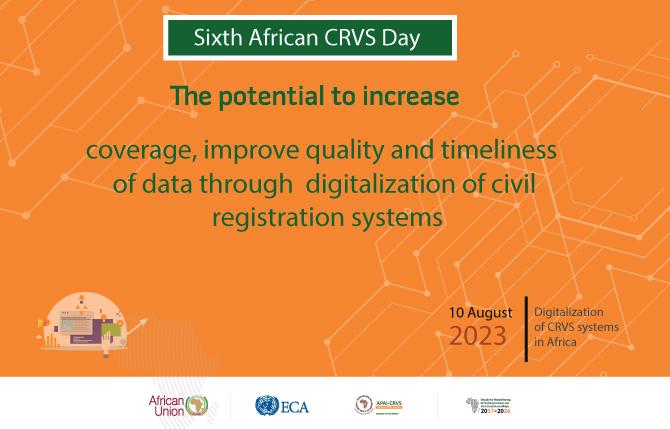The potential to increase coverage, improve quality and timeliness of data through digitalization of civil registration systems
The CRVS community in Africa has kept the tradition of commemorating the CRVS Day on 10 August 2023. This is the Sixth Africa CRVS Day being celebrated during the fourteenth year since the establishment of the Africa Programme for Accelerated Improvement for Civil Registration and Vital Statistics (APAI-CRVS). The CRVS day was adopted by the 32nd Ordinary Session of the AU Executive Council in 2018 as a vehicle to enhance advocacy on the importance of CRVS systems for Africa’s growth. It is also an occasion to voice support to country, regional and global commitments to strengthen CRVS systems and increase stakeholder coordination to maximize available CRVS resources. This year’s celebration commits African Countries to transform and modernize their CRVS systems though digitalization.
The issue of digitalization of CRVS systems in Africa has been the subject of discussions at our Conferences of Ministers and now is the time to take decisive actions. At the COM4 in 2017 in Nouakchott, ECA, as the secretariat of APAI- CRVS, was encouraged to lead the development of common ICT assets to support effective CRVS systems across Africa, ensuring the highest standards of data protection and confidentiality of personal data, in order to promote interoperability among civil registration, health and identity management systems, to meet the needs of all African countries. At COM5 in 20219 in Lusaka, African Member States were encouraged to strengthen investment in digitization to facilitate interoperability between identity management systems National Civil Registration and Vital Statistics systems, within a framework of a strong data protection policy, as well as take steps to ensure the widespread recognition of identity documents issued to persons in need of international protection.
The issue of accelerating efforts to set up integrated safe, innovative, and cost-effective digitalized CRVS systems in Africa took centre stage during the expert segment of the 6th Conference of African Ministers Responsible for Civil Registration. To leapfrog African countries towards attaining SDG16.9, digitalization has been placed at the forefront of CRVS system strengthening. Specifically, the experts agreed to:
(i) Actively pursue the digitalization of civil registration and vital statistics systems to harness their full potential, enhancing registration coverage and outreach.
(ii) Strengthen the safety and security of data-sharing practices and interoperability between systems.
(iii) Take into consideration key legal and regulatory frameworks and the information technology and infrastructure in place at the national level in their efforts to modernize and digitalize civil registration and vital statistics systems, according to central priority
2
to data safety and security, system integrity, the clarity of data ownership and data availability.
(iv) Take into consideration the available technical and resource capabilities when planning, procuring, and implementing digital technologies, which should include ensuring well-developed business processes.
(v) Develop the technical capacity of essential personnel to understand, manage and sustain systems use, thereby avoiding extensive reliance on solution providers and potential vendor lock-in.
As we commemorate the Sixth Africa CRVS Day, African countries are encouraged to advance the digitization of civil registration data as part of the critical digital public infrastructure to promote the interlinkage and use of civil registration and vital statistics data and identification data across government agencies. Digitalization of the CRVS processes from notification to certification transforms civil registration from slow, passive, and reactive systems that depend on in-person attendance, to systems that are resilient, proactive, and agile. Technology provides the platform for interoperability and real-time data sharing for efficient governance and e-commerce.
Furthermore, digitalization establishes links between civil registration authorities and the health sector so that vital events occurring in health institutions can be formally reported to the civil registration authorities. This strategy of active notification by the health sector will reduce the number of in-person visits demanded of family members and, especially for events occurring in health facilities, alleviate the burden of families having to travel to civil registration offices. Active notification by health agents will improve the registration of events that are missed by civil registration systems such as deaths in infancy as well as the under-registration of female deaths that has been observed in a number of settings.
On this day, 10 August 2023, all African Countries commit, as agreed from COM4 to COM6 to actively pursue the digitalization of civil registration and vital statistics systems to harness their full potential, enhancing registration coverage and outreach.
